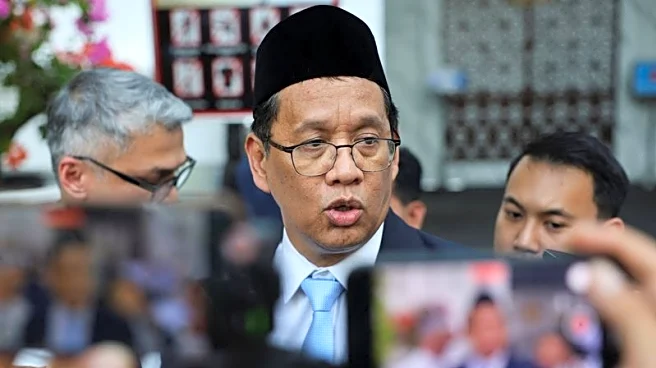(Reuters) -Indonesia's well-regarded finance minister Sri Mulyani Indrawati was removed from her position on Monday as part of a broader cabinet reshuffle, with the president appointing an economist, Purbaya
Yudhi Sadewa, to replace her.
The country's main stock index fell 1.3%, while the rupiah spiked 0.7%, set for its biggest intraday gain in over two months.
Here are analyst comments on the changes.
JASON TUVEY, DEPUTY CHIEF EMERGING MARKETS ECONOMIST, CAPITAL ECONOMICS, LONDON:
"The removal of Indonesia's well-respected Finance Minister Sri Mulyani from her post will raise concerns that, in the wake of recent protests in the country, President Prabowo Subianto will seek to loosen the fiscal rules and potentially place greater pressure on the central bank to support the government's economic objectives.
"At this stage, his (Purbaya Yudhi Sadewa) views on economic policy are unclear, but the key risk is that he proves to be more pliant to the president’s wishes. That could lead to efforts to ditch, or at least look for ways around, the existing fiscal rules. There could even be pressure on the central bank to loosen monetary policy more aggressively and more proactively support government programmes."
TRINH NGUYEN, SENIOR ECONOMIST FOR EMERGING ASIA, NATIXIS, HONG KONG:
"The key question for markets is whether Prabowo can have his cake and eat it too. To afford the lunch program, she (Mulyani) had to make the difficult decision of cutting expenditure very aggressively to maintain fiscal sustainability and also the negative 3% of GDP fiscal limit.
"The issue is how is the new Finance Minister going to afford the 1.5% of GDP lunch program and at the same time raise spending for sectors such as defense without punching a larger hole in the deficit. For investors, that will be a key concern."
SAKTIANDI SUPAAT, REGIONAL HEAD OF FX RESEARCH AND STRATEGY, GLOBAL MARKETS, MAYBANK, SINGAPORE:
"The rupiah reacted quite sharply... I suppose the reaction is not surprising, because it was unexpected.
"I think that there would definitely be concerns about how the fiscal situation would be in terms of fiscal policy developments out of Indonesia going forward, but I think markets are probably going to wait for the finance ministry's statement and comments about, under the new leadership, what their plans will be. But I think in the interim, there will be some efforts by BI to make sure the currency remains stable ... in terms of reducing any unexpected sharp volatility that may impact business conditions.
"Sri Mulyani has been a stable anchor ... and she has international standing. So I think whoever fills her shoes has very big shoes to fill, but also foreign investors would need to hear some statements from the ministry to get some reassurance."
ANINDA MITRA, HEAD OF ASIA MACRO STRATEGY, BNY INVESTMENT INSTITUTE, SINGAPORE:
"I would say today's decision seems quite abrupt and unexpected. In the context of the recent turmoil in local and global markets, market participants will want certainty about policy settings and a steady hand at the fiscal till. The IDR may have to bear the brunt of the removal of Indonesia's veteran finance minister until greater confidence about what the cabinet reshuffle entails for any prospective shifts in budgetary outlays and funding sources."
MOHIT MIRPURI, FUND MANAGER, SGMC CAPITAL, SINGAPORE:
"Mulyani's departure, though not unexpected after recent unrest, marks the end of an era of fiscal credibility."
HASNAIN MALIK, EM EQUITY AND GEOPOLITICS STRATEGIST AT TELLIMER, DUBAI:
"Mulyani was the safeguard of prudent fiscal policy. Therefore, her departure will stir up fears of widening deficits under an unconstrained and, after the protests, under-pressure Prabowo."
RYOTA ABE, ECONOMIST, SMBC, SINGAPORE:
"Sri Mulyani Indrawati’s departure poses significant damage to the Indonesian fiscal position and to global investors in the near term.
"In the near term, Bank Indonesia is likely to be forced to intervene intensively in the financial markets to prevent the IDR from falling further."
(Reporting by Rae Wee and Ankur Banerjee in Singapore, Sameer Manekar in Bengaluru; Compiled by Sumeet Chatterjee; Editing by Sonali Paul)









